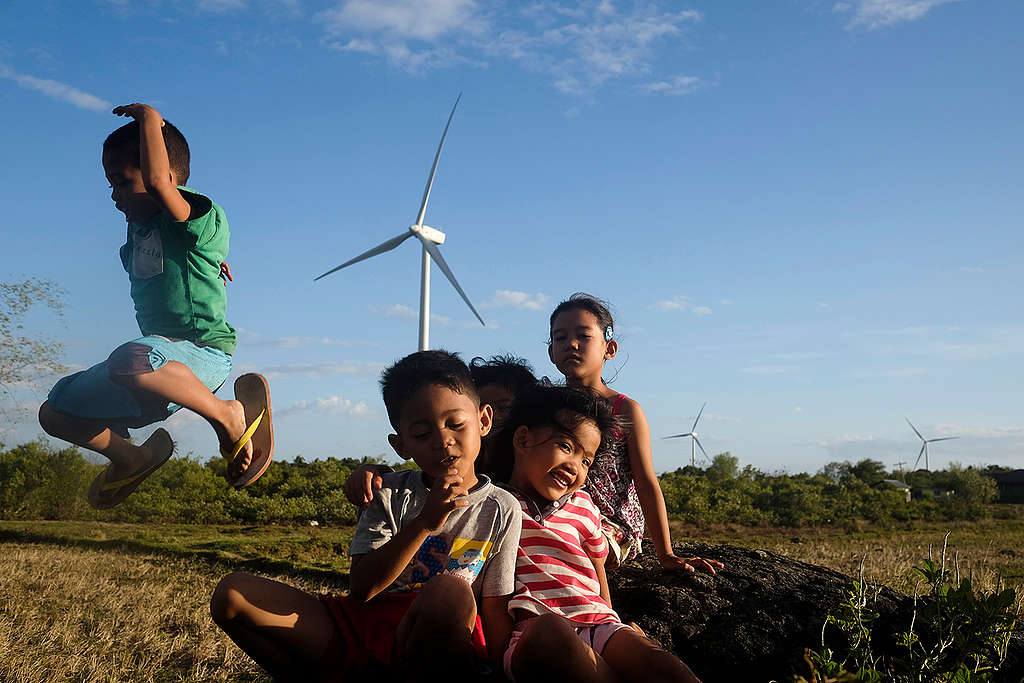QUEZON CITY, Philippines, 6 November 2021 – Over 190 countries and organizations have signed a statement seeking to phase out coal in powerful countries by the 2030s and in the rest of the world by the 2040s. The agreement includes four goals: (1) Rapidly scale up the deployment of clean power generation, (2) phase out coal power in economies in the 2030s for major economies and 2040s for the rest of the world, (3) end all investment in new coal power generation domestically and internationally; and (4) make a just transition away from coal power in a way that benefits workers and communities.
The Philippine national government, through Energy Secretary Alfonso Cusi, only endorsed clauses one and four, snubbing the call to phase out coal and end investment in coal power generation domestically and internationally.
Reacting to the development, Greenpeace Philippines Campaigner Khevin Yu said:
“With the impacts of the climate crisis already haunting communities, especially in the Philippines, the world does not need phony, half-hearted commitments from COP 26. The agreement outlines a clear action plan for the complete phase-out of coal. Greenpeace believes this can actually be achieved sooner than 2040. But the reception of countries to this agreement shows the lack of political will among major historical and current emitters–as well as countries like the Philippines—to urgently solve the climate crisis and the injustices it brings to communities.
“Greenpeace denounces in the strongest possible terms the Philippine government’s shameless climate hypocrisy and its lack of political will to end coal use and chart a decisive path away from dependence on fossil fuels.
“The DOE’s delusions that it can have its cake and eat it too—transition away from coal power and shift to RE, without ending coal investments or phasing out coal power—is utterly ridiculous. It also reveals that the government has no intention of veering away from its fossil fuel trajectory. Worse, the move reeks of efforts to protect the interest of coal and fossil fuel companies at the expense of the welfare of Filipino communities. We believe Sec. Cusi’s non-commitment isn’t fooling anybody. Instead, he’s exposed how the DOE is seemingly the biggest barrier toward a genuine just energy transition.
“The Philippine government should not miss the opportunity to use COP 26 as a rallying point to stop the expansion of coal and other fossil fuel projects globally, and also in its own backyard. At the COP, the Philippine delegation should call on other countries, particularly rich nations, to sign on to and commit themselves to this agreement, and use this to strengthen the call for greater climate finance.
“Meanwhile, the government itself should also end its double talk and start showing that it is genuinely committed to climate action. The DOE should ramp up its commitment to phase out coal by revising the Philippine Energy Plan. It should increase the country’s renewable energy target to 50% by 2030, halt all plans for fossil gas, and improve grid development for utility-scale solar and wind to massively scale up RE deployment.”
###
The DOE is aiming for renewable energy to account for 35 percent of the Philippine energy mix by 2030 but it still considers coal and petroleum to meet the country’s power needs.
Media contact:
Khevin Yu
Greenpeace Philippines Campaigner
[email protected] | +63 998 966 4807
Angeli Cantillana
Communications Campaigner, Greenpeace Southeast Asia – Philippines
[email protected] | +63 998 595 9733

Renewable energy is the key to our country’s energy independence. But coal companies and politicians are holding us back.
